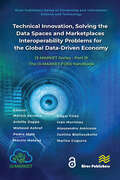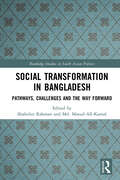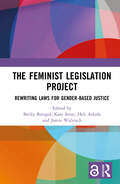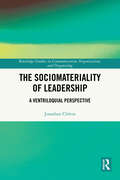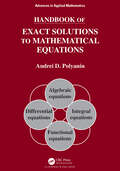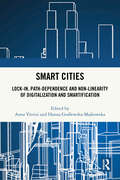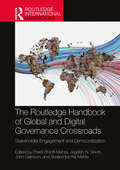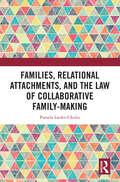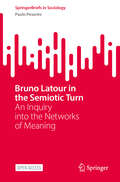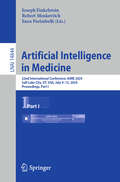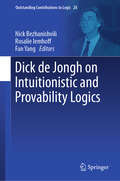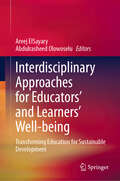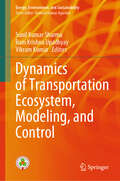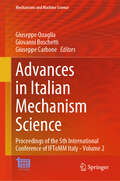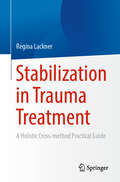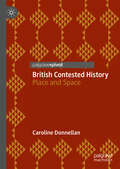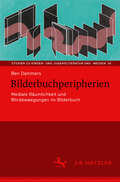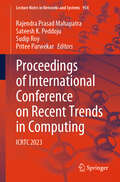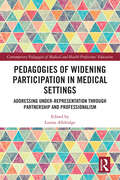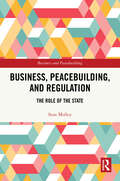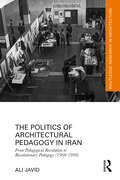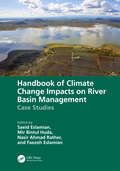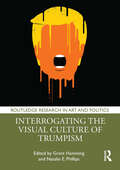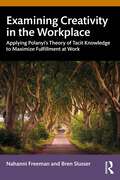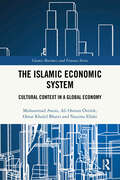- Table View
- List View
Technical Innovation, solving the Data Spaces and Marketplaces Interoperability Problems for the Global Data-Driven Economy: i3-MARKET Series - Part III: The i3-MARKET FOSS Handbook (River Publishers Series in Computing and Information Science and Technology)
by Martín Serrano Achille Zappa Waheed Ashraf Pedro Maló Márcio Mateus Edgar Fries Iván Martínez Alessandro Amicone Justina Bieliauskaite Marina CugurraIn the third i3-MARKET series book we focus on the best practices and simplest software methods and mechanisms that allow the i3-MARKET backplane reference implementation to be instantiated, tested and validated even before the technical expert and developer communities decide to integrate the i3-MARKET as a reference implementation or adopted open-source software tools. The purpose of this book is to offer a clear understanding of the technological components as well as the software infrastructures, and the steps to be followed to avoid overwhelming the deployment activity.i3-MARKET has three industrial pilots defined in terms of data resources used to deploy data-driven applications that use the most of the i3-MARKET backplane services and functionalities. The different software technologies developed, including the use of open-source frameworks, within the context of the i3-MARKET is considered as a bill of software artefacts of the resources needed to perform demonstrators, proof of concepts, and prototype solutions. The i3-MARKET handbook can be used as input for configurators and developers to set up and pre-test testbeds and therefore it is extremely valuable to organizations if used properly.
Social Transformation in Bangladesh: Pathways, Challenges and the Way Forward (Routledge Studies in South Asian Politics)
by Shahidur RahmanSocial Transformation in Bangladesh explores the social, political, and cultural implications of the unprecedented economic development that has occurred in Bangladesh since its independence in 1971.In the 1970s, Bangladesh was labelled an international basket case because of food insecurity and low levels of per capita income with high population growth and various social problems. Defying overwhelming odds, however, a societal transformation is underway in Bangladesh with diverse opportunities and challenges. This edited book analyses issues of inclusivity, extractivism, sustainability and equitability as it takes a look at the interconnected metamorphosis of the economy, society, culture, and the environment of Bangladesh. Discussing topics from the products of post-industrial society, such as YouTube sensations and digital labour platforms, to groups that have suffered marginalisation for decades, such as the urban poor, and Indigenous peoples, a wide array of scholarship and case studies are used to analyse the challenges and opportunities offered by the process of societal transformation.With insights from multidisciplinary scholars, this collection will be of great interest to those specialising in the fields of sociology, political science, anthropology, development, refugee and migrant studies, media studies, labour studies, health, and indigeneity.
The Feminist Legislation Project: Rewriting Laws for Gender-Based Justice
by Heli Askola Kate Seear Jamie Walvisch Becky BatagolIn this book, leading law academics along with lawyers, activists and others demonstrate what legislation could look like if its concern was to create justice for women.Each chapter contains a short piece of legislation – proposed in order to address a contemporary legal problem from a feminist perspective. These range across criminal law (sexual offences, Indigenous women’s experiences of criminal law, laws in relation to forced marriage, modern slavery, childcare and sentencing), civil law (aged care and housing rights, regulating the gig economy; surrogacy, gender equity in the construction industry) and constitutional law (human rights legislation, reimagining parliaments where laws are made for the benefit of women). The proposed laws are, moreover, drafted with feedback from a senior parliamentary draftsperson (providing guidance to contributors in a personal capacity), to ensure conformity with legislative rigour, as well as accompanied by an explanation of their reasons and their aims. Although the legislation is Australian-based, the issues raised by each are recognisably global, and are reflected in the legislation of most other nations.This first feminist legislation project will appeal to scholars of feminist legal studies, gender and the law, gender studies and others studying or working in relevant legal areas.
The Sociomateriality of Leadership: A Ventriloquial Perspective (Routledge Studies in Communication, Organization, and Organizing)
by Jonathan CliftonWith the parallel expansion of both leadership research and the use of ventriloquism within communication studies, this book addresses the lack of connection between the two, arguing that ventriloquial analyses can add significant insights to leadership research and that leadership research can be a fruitful avenue of inquiry.Focusing on the ventriloquial approach to organising originating from the Montreal School, which emphasizes the analyses of “actions through which someone or something makes someone or something else say or do things”, the book offers a new and exciting way of looking at the materiality of leadership. Drawing on ventriloquial analyses of naturally-occurring workplace interaction; interviews with key organisational players; and training sessions about leadership, the author posits that other-than-human actants affect many areas of leadership and organisational communication.Offering fresh insight into leadership practice, this book will be an essential read for scholars and students of organisational communication, leadership, and management.
Handbook of Exact Solutions to Mathematical Equations (ISSN)
by Andrei D. PolyaninThis reference book describes the exact solutions of the following types of mathematical equations:● Algebraic and Transcendental Equations ● Ordinary Differential Equations ● Systems of Ordinary Differential Equations ● First-Order Partial Differential Equations ● Linear Equations and Problems of Mathematical Physics ● Nonlinear Equations of Mathematical Physics ● Systems of Partial Differential Equations ● Integral Equations ● Difference and Functional Equations ● Ordinary Functional Differential Equations ● Partial Functional Differential EquationsThe book delves into equations that find practical applications in a wide array of natural and engineering sciences, including the theory of heat and mass transfer, wave theory, hydrodynamics, gas dynamics, combustion theory, elasticity theory, general mechanics, theoretical physics, nonlinear optics, biology, chemical engineering sciences, ecology, and more. Most of these equations are of a reasonably general form and dependent on free parameters or arbitrary functions.The Handbook of Exact Solutions to Mathematical Equations generally has no analogs in world literature and contains a vast amount of new material. The exact solutions given in the book, being rigorous mathematical standards, can be used as test problems to assess the accuracy and verify the adequacy of various numerical and approximate analytical methods for solving mathematical equations, as well as to check and compare the effectiveness of exact analytical methods.
Smart Cities: Lock-in, Path-dependence and Non-linearity of Digitalization and Smartification (Advances In Science, Technology And Innovation Ser.)
by Anna Visvizi Hanna Godlewska-MajkowskaThis book seeks to identify and to examine factors and mechanisms underlying the growth and development of smart cities.It is commonplace to discuss smart cities through the lens of advances in ICT. The resulting overemphasis on what is technologically possible downplays what is politically, socially and economically feasible. This book, by analysing the smart city through a variety of perspectives, offers a more comprehensive insight into and understanding of the complex and the open-ended nature of the growth and development of a smart city. A solid conceptual framework is developed and employed throughout the chapters, and a selection of case studies from Europe, Asia, and the Arab Peninsula grants the readers a hands-on perspective of the matters discussed.The chapters included in this book address a set of questions, including: How do the twin-processes of digitalization and smartification unfold in the context of the smart city agenda? How do these processes relate to the concepts of smart city 1.0, 2.0., 3.0. and 4.0? In which ways have the spatial aspects of city functioning been influenced by the intrusion of ICT? In which ways do the same processes contribute to the attainment of the UN Sustainable Development Goals (SDGs)? What are the implications of smartification and the emergence of smart organizations (public, private, and voluntary) for the spatial development of smart cities? Do ICT and its application in the city space boost the processes of revitalization and how does ICT influence the process of gentrification? To what extent and how does the intrusion of ICT-enhanced tools and applications in the city space impact on a city’s relationship with its broader territorially defined context? Are the administrative borders and divisions inherent in the fabric of a city becoming less/more porous? How should urban sprawl be conceived in the context of the smart city debate? This book will have a broad appeal to academics, students, and policy makers with interests in urban planning, sustainable development, cities, economics, technology, sociology, urban studies, digitalization, SDGs, wellbeing, and resilience.
The Routledge Handbook of Global and Digital Governance Crossroads: Stakeholder Engagement and Democratization
by Jagdish N. Sheth Preeti Shroff-Mehta John Garrison Shailendra Raj MehtaThis handbook maps and analyzes cross-sector (public–corporate–social–community–faith) governance theories, models, and practices as they are evolving in a digital world. It studies human, cultural, societal, institutional interactions and challenges in a digitally enabled world, especially in the context of post-crisis resilience and agility. Every global crisis forces societies and nations to realign while addressing deeper structural and cultural issues in governance. The Covid-19 pandemic has necessitated swift local-to-global governance responses for timely digital innovations for health crisis interventions, economic recovery, and societal equity. While every nation-state is developing global pandemic responses in a digitally enabled world, the deeper crisis of human, institutional, and societal governance deficit is also evident. This handbook documents digital governance innovations that enhance stakeholder engagement and inclusion for resilient, accountable, and effective governance across sectors. This volume reflects on a range of theoretical frameworks adapted for understanding global and digital governance. It looks at international governance collaborations; corporate governance reform; education governance innovations; public sector and urban governance; health system governance, sustainability, and environmental governance; community and faith-based governance; and digital, cultural, and creativity governance. This book is unique, as it presents important work on post Covid-19 digital and democratic governance and brings together holistic—interdisciplinary and intersectoral— perspectives from the Global North and Global South, engaging the leading scholars, practitioners, businesses, and civil society. It will be of interest to multi-sector institutions and global audiences: governments, corporates, social sector institutions, digital entrepreneurs, students and researchers, academic professionals, policy-makers, public and private sector institutional leaders, and organizational and entrepreneurial innovators interested in the field of governance.
Families, Relational Attachments, and the Law of Collaborative Family-Making
by Pamela Laufer-UkelesThis book points to a crisis at the heart of modern family law’s treatment of “collaborative family-making”: gamete contributions, surrogate motherhood, adoption, functional parenthood, foster care, and kin caregiving. Born of inequality and anchored by exclusivity and secrecy, the dominant legal framework governing collaborative family-making focuses on the acquisition of collaborative services by legal and intended parents without expecting or fostering any lasting bonds between them. This acquisitional framework is starkly disconnected from empirical accounts of the lived experience of collaborations, which demonstrate complex and ongoing relational attachments that extend beyond a transactional moment. At the intersection of law and sociology, the book is to account for relational realities that fail to conform to neat legal categories of parent and stranger, asking: How should the law reflect the complex interconnections between families and family-making collaborators? Should collaborators be treated as legal strangers? Who is impacted by the lack of legal status possessed by family-making collaborators? Who benefits and who loses? Ultimately, this is a work of optimism that seeks to facilitate family-making collaborations in more ethical ways by insisting that family law recognize and support family-making collaborators. It introduces a bold new legal framework of interconnection and guides the reader in implementing practical legal and contractual changes that promote human dignity, uphold children’s right to identity, and support ongoing relational attachments with adults who are fundamental to children’s lives. The volume provides deep and accessible insight into families and family law for legal practitioners, academics, students, and laypersons interested in family-making collaboration.
Bruno Latour in the Semiotic Turn: An Inquiry into the Networks of Meaning (SpringerBriefs in Sociology)
by Paolo PeveriniThis open access book highlights the link between Bruno Latour's works and the semiotic perspective on social phenomena analysis. It identifies and relaunches a dialogue that was as heated as it was fruitful, but still little recognized within the social sciences. It asks why the theory of signification has so far been only sporadically acknowledged in literature derived from Latour's work. Starting from these premises, the book explores two interrelated dimensions, the initial one of a "semiotics for Latour", which looks at concepts from semiotics in Latour's study of social phenomena, and extensively for the first time, a symmetrical one of a "Latour for semiotics," accounting for the impact of Latourian inquiry on contemporary semiotic research. The book offers a novel perspective on Bruno Latour's work by addressing a wide readership, including those interested in Latour’s approach, actor-network theory, semiotics, and the social sciences. The English translation of this book from the Italian original manuscript was done with the help of artificial intelligence, then revised technically and linguistically by the author in collaboration with a professional translator.
Artificial Intelligence in Medicine: 22nd International Conference, AIME 2024, Salt Lake City, UT, USA, July 9–12, 2024, Proceedings, Part I (Lecture Notes in Computer Science #14844)
by Robert Moskovitch Joseph Finkelstein Enea ParimbelliThis two-volume set LNAI 14844-14845 constitutes the refereed proceedings of the 22nd International Conference on Artificial Intelligence in Medicine, AIME 2024, held in Salt Lake City, UT, USA, during July 9-12, 2024. The 54 full papers and 22 short papers presented in the book were carefully reviewed and selected from 335 submissions. The papers are grouped in the following topical sections: Part I: Predictive modelling and disease risk prediction; natural language processing; bioinformatics and omics; and wearable devices, sensors, and robotics. Part II: Medical imaging analysis; data integration and multimodal analysis; and explainable AI.
Dick de Jongh on Intuitionistic and Provability Logics (Outstanding Contributions to Logic #28)
by Fan Yang Rosalie Iemhoff Nick BezhanishviliThis book is dedicated to Dick de Jongh’s contributions to the theory of intuitionistic and provability logics. Consisting of 13 chapters, written by leading experts, this book discusses de Jongh’s original contributions and consequent developments that have helped to shape these fields. The book begins with an autobiographic note by Dick de Jongh, which discusses the main themes of his work and places the other contributions in context. The next four chapters explore the De Jongh-Sambin fixed point theorem and other contributions to provability and interpretability logics. The following four chapters focus on modal, intuitionistic and intuitionistic modal logics. They discuss independence of formulas, unification and de Jongh formulas in intuitionistic and modal logics. Then there follow two chapters on the other two areas to which Dick de Jongh made important contributions: the theory of well-partial orders, and formal learning theory. The second to last chapter on Origami Geometry can be seen as representing the Master of Logic program of the Institute for Logic, Language and Computation (ILLC) in which de Jongh invested a lot of energy. The book ends with a complete bibliography of Dick de Jongh in the last chapter. This volume provides a vital overview – and continuation of - de Jongh’s prolfic work in the theory of intuitionistic and provability logics.
Interdisciplinary Approaches for Educators' and Learners’ Well-being: Transforming Education for Sustainable Development
by Areej ElSayary Abdulrasheed OlowoseluThis book bridges knowledge gaps by exploring transformative approaches for sustainable development to ensure high-quality and positive education and increase educators' and learners’ well-being. It offers research findings, best practices, case studies and empirical research. The work inspires and guides educators in implementing effective strategies by means of interdisciplinary approaches. It is a valuable resource supporting ongoing professional development for teachers and educational leaders, enhancing pedagogical strategies, curriculum design and a safe positive educational environment. Additionally, it addresses global challenges in education, fostering a broader discourse on education's role in promoting interdisciplinary approaches, sustainable development, and well-being for a more inclusive future.
Dynamics of Transportation Ecosystem, Modeling, and Control (Energy, Environment, and Sustainability)
by Vikram Kumar Ram Krishna Upadhyay Sunil Kumar SharmaTransportation is the lifeblood of modern society, connecting people, goods, and information across the world. However, as our cities grow and the demand for transportation increases, it becomes imperative to understand and manage the intricate dynamics of the transportation ecosystem. This book provides an in-depth exploration of the complex dynamics of transportation systems, with a focus on modeling and control strategies that can enhance efficiency, sustainability, and resilience. It is an indispensable resource for transportation engineers, researchers, students, and professionals seeking a comprehensive understanding of the complex dynamics at play in transportation systems. By delving into advanced modeling techniques, control strategies, and sustainability considerations, this book equips readers with the knowledge needed to navigate and optimize the evolving transportation landscape. This book offers a comprehensive examination of the interconnected elements within the transportation ecosystem, including vehicles, infrastructure, traffic flow, and emerging technologies. It explores advanced modeling and simulation techniques for understanding and predicting transportation system behavior, discussing control strategies that can be applied to optimize transportation systems, enhancing safety, and mitigating congestion, addressing the challenges of sustainability and resilience in transportation, including the integration of eco-friendly technologies and disaster response.
Advances in Italian Mechanism Science: Proceedings of the 5th International Conference of IFToMM Italy - Volume 2 (Mechanisms and Machine Science #164)
by Giuseppe Carbone Giovanni Boschetti Giuseppe QuagliaThis book presents the proceedings of the 5th International Conference of IFToMM ITALY (IFIT), held in Turin, Italy on September 11–13, 2024. It includes peer-reviewed papers on the latest advances in mechanism and machine science, discussing topics such as biomechanical engineering, computational kinematics, the history of mechanism and machine science, gearing and transmissions, multi-body dynamics, robotics and mechatronics, the dynamics of machinery, tribology, vibrations, rotor dynamics and vehicle dynamics. A valuable, up-to-date resource, it offers an essential overview of the subject for scientists and practitioners alike and inspires further investigations and research.
Stabilization in Trauma Treatment: A Holistic Cross-method Practical Guide
by Regina LacknerStabilization is considered the first of the three phases of trauma treatment and a prerequisite for successful trauma confrontation. But what does stabilization mean, what effect does it have, and above all: what variety of stabilizing interventions are there?This practical guide presents various approaches and a wealth of different interventions and exercises that have proven themselves in practice. In addition, it clearly shows that stabilization can achieve much more than one might expect: it brings with it a variety of other effects, so that it contributes to a comprehensive strengthening and healing of our clients. Thus, it facilitates, accelerates and expands the process of trauma treatment. A large repertoire of interventions, exercises and suggestions, as well as numerous examples, illustrate its implementation in practice. The book is aimed at psychotherapists, psychologists, physicians and members of other helping professions.
British Contested History: Place and Space
by Caroline DonnellanThis book examines the issues arising from British contested history by looking at how it came to be constructed, how it developed, and how attitudes over time have begun to change towards it. It considers how this narrative was first created through the writing of British history. It explores the private spaces of the court, the political places of the state, and the public places of the street. Beyond British shores this history has also been enacted through international heritage sites when objects were removed and taken back to Britain. Conclusively, it explores how the historic spaces of a maritime city, has further entrenched an already complex history of the nation. How this research brings new insights into this field is by looking at it through the lens of place, space, and the spatial turn. The underlining research questions are: What role does place and space play in historical constructions of the past? How do place and space contribute to contested history? How can these places and spaces be re-appropriated and reused, and endowed with new meanings?
Bilderbuchperipherien: Mediale Räumlichkeit und Blickbewegungen im Bilderbuch (Studien zu Kinder- und Jugendliteratur und -medien #16)
by Ben DammersDieses Buch bietet die erste literatur- und medientheoretisch fundierte Studie zu Blickbewegungen im Bilderbuch. Es begegnet zwei Forschungsdesideraten: Der empirischen Untersuchung geht eine umfassende theoretische Auseinandersetzung mit der Räumlichkeit und Paratextualität des Bilderbuchs voraus, die bislang noch nicht vorliegt. Die Rezeptionsstudie setzt sich in zweierlei Hinsicht von bereits vorliegenden Arbeiten zur Bilderbuchrezeption ab: Anders als in Blickbewegungsstudien aus der experimentellen Psychologie wird die Komplexität des Rezeptionsgegenstandes in die Analyse der Blickbewegungen einbezogen. So setzt die Studie nicht auf bildschirmbasierte Schrift-Bild-Kombinationen oder fragmentierte Ausschnitte, sondern erforscht die Rezeptionsprozesse im Umgang mit authentischen Printbilderbüchern. So gerät auch die Relevanz von Räumlichkeit und Materialität des Mediums für die Rezeption in den Blick. Anders als bereits vorliegende Bilderbuchrezeptionsstudien aus dem literaturdidaktischen Kontext untersucht diese Studie nicht nur post hoc in einem inszenierten Setting erhobene verbale Daten (z.B. Anschlussinterviews), sondern kombiniert die Aufzeichnung von Blickdaten mit der Erhebung flankierender qualitativer Daten in einem möglichst ungesteuerten Rezeptionsprozess.
Proceedings of International Conference on Recent Trends in Computing: ICRTC 2023 (Lecture Notes in Networks and Systems #954)
by Sateesh K. Peddoju Rajendra Prasad Mahapatra Sudip Roy Pritee ParwekarThis book is a collection of high-quality peer-reviewed research papers presented at International Conference on Recent Trends in Computing (ICRTC 2023) held at SRM Institute of Science and Technology, Ghaziabad, Delhi, India, during June 2–3, 2023. The book discusses a wide variety of industrial, engineering, and scientific applications of the emerging techniques. The book presents original works from researchers from academic and industry in the field of networking, security, big data, and the Internet of things.
Pedagogies of Widening Participation in Medical Settings: Addressing Under-representation through Partnership and Professionalism (Contemporary Pedagogies of Medical and Health Professions’ Education)
by Louise AlldridgeAddressing the fact that under-representation has been a concern for medical educators, medical councils, and the government for some time, this book presents the first evidence-based monograph for pedagogies that can be applied to all aspects of widening participation, tackling chronic under-representation in medical settings.Discussing implications that have international ramifications for the field, the chapters showcase a variety of case studies, research, and evaluations that draw on experiences and insights from a wide range of current practitioners, exploring topics such as outreach, access, selection, retention, and progression. From widening participation leads and officers to national representative bodies and students from medical schools nationwide, the book sets out perspectives, guidelines, and research that can be applied throughout the medical student life cycle. Novel in approach and timely in content, this edited collection coincides with the drive to increase social mobility and the proportion of medical students from educationally and socially disadvantaged backgrounds, directly tackling the class system and elitism present in the medical professions.This book will be of great benefit to scholars, researchers, and postgraduate students in the fields of medical education, multicultural education, and higher education, as well as those researching the idea of widening participation in the medical field and diversity in the professions more specifically.
Business, Peacebuilding, and Regulation: The Role of the State (Business and Peacebuilding)
by Sean MolloyThis book examines the relationship between business-based peacebuilding and the opportunities that emerge from the pluralisation of regulation. The core message is, notwithstanding the broad range of regulatory initiatives and actors that exist in conflict-affected settings, the state should assume responsibilities for defining the types of contribution that business can and ought to make to peace. It also demonstrates how the state, through different forms and methods of regulation, is well-placed to engage businesses to do so. It is particularly concerned with the potential for regulation to help address what is identified as a state of optimistic uncertainty in the field of business and peacebuilding. On one level, there is a sense of optimism around the types of contributions that businesses can and often do make as agents for peace. On another, there are varying degrees of uncertainty surrounding the actual peacebuilding impacts of business activities; how businesses are to understand the ways in which to make these contributions, and why businesses would do so. Regulation, this book will argue, can play an important role in bridging the chasm between optimism and uncertainty. This book will be of interest to those engaged not only with business and peacebuilding but also business and human rights, business and development and business and the environment. Moreover, this book is also of contemporary interest in other ways – the aftermath of the Ukranian conflict, as an example, will require a concerted effort to rebuild that society after war. Private sector actors could be a powerful vehicle for reconstruction and development and this book examines how regulation can be used to facilitate businesses involvement in peacebuilding efforts.
The Politics of Architectural Pedagogy in Iran: From Pedagogical Revolution to Revolutionary Pedagogy (1960-1990) (Routledge Research in Architecture)
by Ali JavidThe Politics of Architectural Pedagogy in Iran explores the evolution of architectural pedagogy during two significant socio-political upheavals in Iran: The White Revolution (1963) and the Islamic Revolution (1979). It examines how these transformative periods influenced the field, providing valuable insights into the intersection of architectural education and broader socio-political shifts in Iran.By examining the critical role of education in achieving geopolitical objectives during the Cold War, this book explores architectural pedagogy as an agent for resistance and revolution. It highlights how architectural pedagogy not only reflects radical ideologies but also actively engages in socio-political transformation. The book uncovers how architectural pedagogy became one of the mechanisms to accomplish revolutionary goals. This is evident in initiatives like the "Pedagogical Revolution" during the White Revolution (1963), aimed at modernizing educational institutions, and the "Revolutionary Pedagogy" during the Islamic Revolution (1979), which sought to serve the masses and the religious revolutionary society. In this way, the book adds a new geopolitical perspective to the contemporary discourse of radical pedagogies.This book explores the intricate connections between architectural pedagogy and politics through a transdisciplinary approach. It analyzes original multilingual documents, including political agendas, cultural agreements, curricula, teaching methods, student works, exhibitions, and conferences. It will be of interest to architectural historians and architecture students, particularly those interested in Global South development, modernism, architectural pedagogy, international relations, and Middle Eastern studies.
Handbook of Climate Change Impacts on River Basin Management: Case Studies
by Saeid Eslamian, Mir Bintul Huda, Nasir Ahmad Rather, and Faezeh EslamianClimate change not only involves rising temperatures but it can also alter the hydro-meteorological parameters of a region and the corresponding changes emerging in the various biotic or abiotic environmental features.One of the results of climate change has been the impact on the sediment yield and its transport. These changes have implications for various other environmental components, particularly soils, water bodies, water quality, land productivity, sedimentation processes, glacier dynamics, and risk management strategies to name a few.This volume presents a diverse collection of case studies from researchers across the globe examining the impacts of climate change on river basin management in various geographical, hydrological, and socioeconomic contexts. The case studies yield important insights that can inform strategies to build resilience and adapt river basins to a changing climate.
Interrogating the Visual Culture of Trumpism (Routledge Research in Art and Politics)
by Grant Hamming Natalie E. PhillipsBringing together scholars from art history, visual studies, and related disciplines, this edited volume asks why Trumpism looks the way it does and what that look means for American—and global—society.Grouped into six categories, the essays in this volume tackle some of the most perplexing—and urgent—aspects of the Trumpist visual project. Two of the most striking aspects of that project are its use of novel commodity forms, including the iconic red baseball caps, as well as its embrace of social media. Trump’s outlandish persona and striking physicality have lent themselves to caricature both from his critics and, perhaps more surprisingly, his supporters. That physicality—as well as his movement’s hearkening back to a (mostly imagined) era of mid-twentieth-century prosperity—has also brought gender and the body into sharp focus. Perhaps second only to the aforementioned red hat is Trumpism’s vigorous use of interventions into public space, including traditional campaign signs as well as flags and other ad hoc visual and architectural materials. Finally, there were the events of January 6, 2021, when many of Trumpism’s most outré visual and cultural preoccupations exploded from the shadows onto television screens across the country. Taken as a whole, the essays in this book examine Trumpist visuality from the seemingly trivial to the starkly horrifying, as well as offering a measured sense of the various resistances and responses that have characterized artistic responses to Trump from the beginning of his prominence.The book will be of interest to scholars working in art history, visual culture, American studies, and cultural and media studies.
Examining Creativity in the Workplace: Applying Polanyi’s Theory of Tacit Knowledge to Maximize Fulfillment at Work
by Nahanni Freeman Bren SlusserThis scholarly book explores the intersection of social cognition with a democratic philosophy of human resource management to advance a theory of workplace function that maximizes creativity. It examines how the work of Polanyi on tacit knowledge provides a useful theoretical structure for understanding person perception and self‑fulfilling prophecy effects in the workplace, with a focus on gender, culture, and race as diversity variables. Based on a broad range of interdisciplinary empirical evidence and theories, this book provides a foundational set of concepts to build new applied intervention strategies. The authors create new, testable theories based on a synthesis of several major areas of research in social psychology and human resource management, moving beyond the narrow confines of trends in a particular subdomain. Part 1 offers a literature review of the field, ranging from theoretical, historical, and philosophical psychology to social psychology and neurocognition. Each chapter in this section offers a novel theory that is pertinent to workplace innovation, synthesized from existing evidence. Part 2 reveals applications of tacit knowledge to the field of human resource management, with a focus on cross‑cultural applications for low‑ and high‑power distance settings. This insightful text presents the authors’ original, qualitative research around workplace creativity and tacit knowledge and is valuable reading for scholars and advanced students in industrial‑organizational psychology and human resource management.
The Islamic Economic System: Cultural Context in a Global Economy (Islamic Business and Finance Series)
by Muhammad Awais Ali Osman Öztürk Omar Khalid Bhatti Nazima EllahiIslamic Economics refers to financial aspects or monetary activities and processes, which adhere to Islamic standards and teachings. The Islamic Economic System relates to the hypothetical development of an economy whose individuals follow the Islamic faith. This book presents an interesting and timely narrative of the concepts of Islamic economics in the context of Islamic culture. Its purpose is to guide individuals and organizations towards a Shariah-based Islamic Economic System.It begins by introducing the Islamic Economic System; its historical origins are explained in the framework of the verses of the Holy Quran, and in light of the Shariah scholars and the philosophical thinkers of the mid-20th century. It discusses concepts such as the evolution of Islamic Fintech and Artificial Intelligence (AI); the relationship between Islamic corporate governance and Islamic Economics; the distribution of wealth in Islam; Islamic Social Finance; Islamic Economic practices in the banking industry, behavioural norms and moral foundations; and Islamic Economics in Organisation of Islamic Cooperation (OIC) and non-OIC countries. The author emphasizes the principles that set Islamic economics apart from traditional systems, grounded in Shariah evidence and highlights the role of Islamic principles in promoting overall business success and ethical practices in the banking industry, offering comparative analysis between Islamic and conventional models, as well as economic systems. Drawing on a rich array of sources, including the Quran and interviews with renowned religious scholars, the book provides a well-rounded and thoroughly researched argument.This book will serve as a valuable resource for academics, scholars, researchers, and organizations seeking to navigate the complexities of an interest-free economic system guided by Islamic principles.
